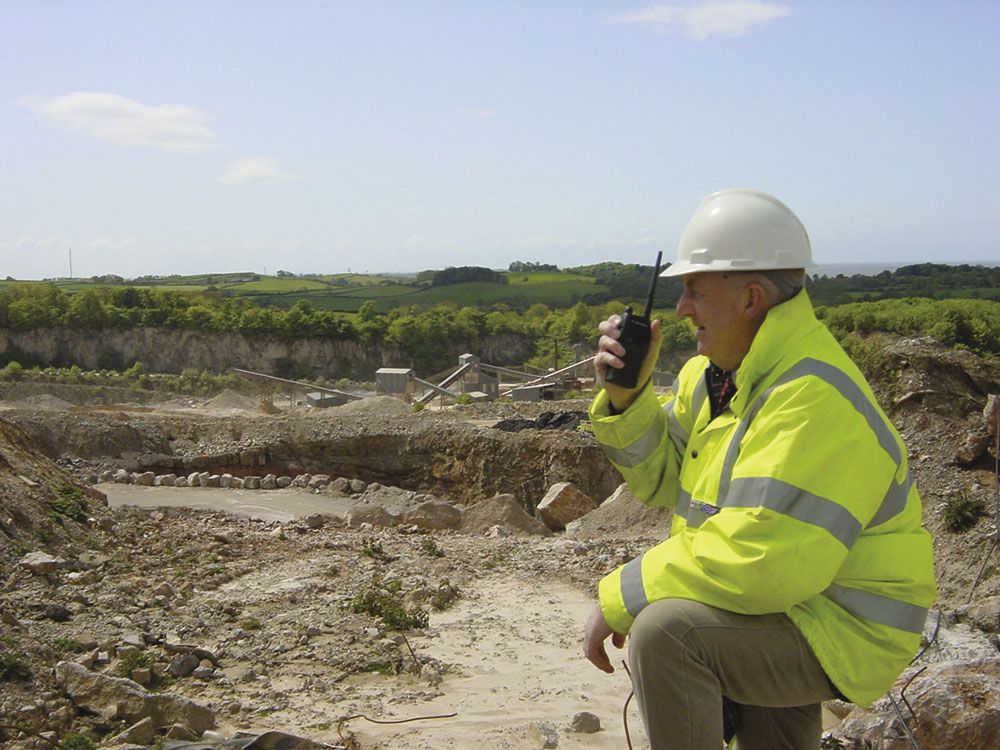Keep In Touch

Communicating with lone workers in a safety critical industry
Dependability is, without doubt, the number one consideration when choosing a communications system, especially for locations where lone workers operate. With health and safety of paramount importance, nothing can be left to chance in safety- critical industries such as quarrying.
In order to achieve the high safety levels required, two factors should be carefully considered.
First, when looking at communications hardware, users should not underestimate just how much hard work it will need to stand up to. Harsh weather and an arduous working environment mean that robust equipment is essential. The most reliable piece of equipment for the job is, without doubt, a good-quality two-way radio.
Secondly, there is the vital issue of network coverage. Two-way radio provides an excellent method of communication and does not rely upon mobile phone network coverage, unlike some other systems that are available. Due to the nature of the industry and remoteness of most quarries, mobile network coverage cannot be guaranteed and in many instances will not work at all.
Lone-worker function
In Touch Ltd of Morecambe, offer two-way radios that have an in-built lone-worker function. Using radio to communicate any potential emergency situation is a far more cost-effective solution than landline-based systems. At predetermined intervals, the lone-worker function on the two-way radio emits a continuous tone and if the user does not respond by pressing a button within a set time limit, the radio will transmit an emergency signal to all other radio users. This indicates to the rest of the workforce that the lone worker may be in difficulty and require immediate assistance.
Over the last 20 years, In Touch have been relied upon by some of the biggest names in quarrying, construction and civil engineering throughout the UK. The company’s short-term monthly rental agreements mean that customers are not tied in to lengthy contracts and on-site surveys are completely free. In addition, at the customer’s request, radios are renewed every two years to ensure that the system is always at peak performance.
Mobile solution keeps workforce In Touch at Glensanda
Glensanda, on Scotland’s rugged west coast, is Europe’s largest coastal super-quarry. Located on the remote Morvern peninsula and only accessible by sea, the site’s operators, Aggregate Industries, have faced a number of major challenges.
One of the main issues was a lack of mobile communication with key workers due to poor signal strength and outdated equipment. This was of serious concern to the management, not only from an operational point of view, but also because it raised many health and safety issues.
Built into the hillside, Glensanda has various operational areas, all of which need to be linked. It also has a mile-long tunnel within which a conveyor carries product from the primary surge pile to secondary and tertiary crushers. Inevitably, key workers have to enter the tunnel on a regular basis. However, tunnels are notorious for radio-transmission problems and Glensanda was no exception. With communications almost non-existent, management were concerned that the workforce could be at risk, particularly within this unique environment.
As the national preferred supplier to Aggregate Industries, In Touch were commissioned to provide an integrated mobile communications solution for the entire site. Working closely with 2CL (the company’s Motorola main dealer), In Touch conducted a thorough site survey and met with local management to identify the key issues.
The existing radio system was found to be rather unusual in that it was operated through a talk-through repeater station based on an island in the middle of Loch Linnhe. Initially, this had worked well, but as the quarry increased in size communication quality began to deteriorate, despite the installation of additional equipment within the extraction area. Radio coverage in the tunnel had always been problematic and, as such, was the main driver in implementing the new system to improve health and safety on site.
The challenge faced by In Touch was to provide radio communications for the tunnel and throughout the whole of the quarry. Giving utmost priority to communications performance and reliability, In Touch’s expert technicians recommended the installation of two talk-through base stations, using directional aerials and linked together by landline and microwave links with the rest of the site to provide a total communications solution.
The remoteness of the site and importance of communications highlighted the need for a robust and reliable system which would be resilient in harsh conditions. This was factored in when designing and building the system and battery back-up was installed throughout, allowing the system to continue operating for up to 5h if a power interruption occurs. As an added safety feature, should part of the system fail, a fall-back mode of stand-alone repeaters becomes operational.
In the tunnel, the workforce are provided with radios which scan between the tunnel frequencies and the external frequency, greatly improving site safety and allowing instant and clear communication with management and co-workers.
In Touch were also able to assist in obtaining all the relevant licenses from OFCOM, which included both duplex and simplex channels required to support the communications systems at the site.
David Lamb, deputy works manager for Yeoman Glensanda, commented: ‘Lack of good radio coverage in some key areas of the quarry had been a safety concern for some time, and finding a workable solution had not been an easy path. Once again, In Touch and 2CL proved they have both technical knowledge and creativity to come up with solutions that are practicable and affordable.’
In Touch Ltd, Victoria Buildings, 66–67 Marine Road West, Morecambe, Lancashire LA4 4ET; tel: (01524) 833588.


